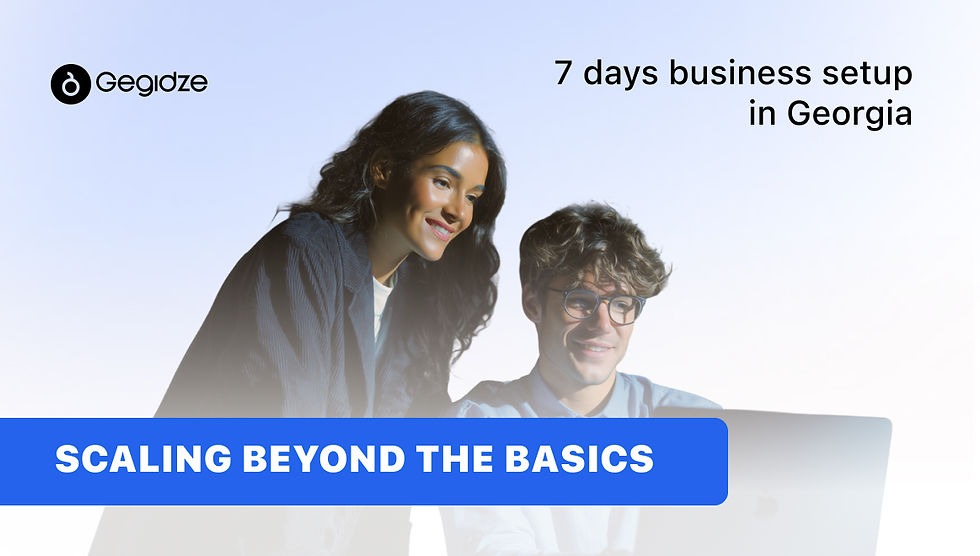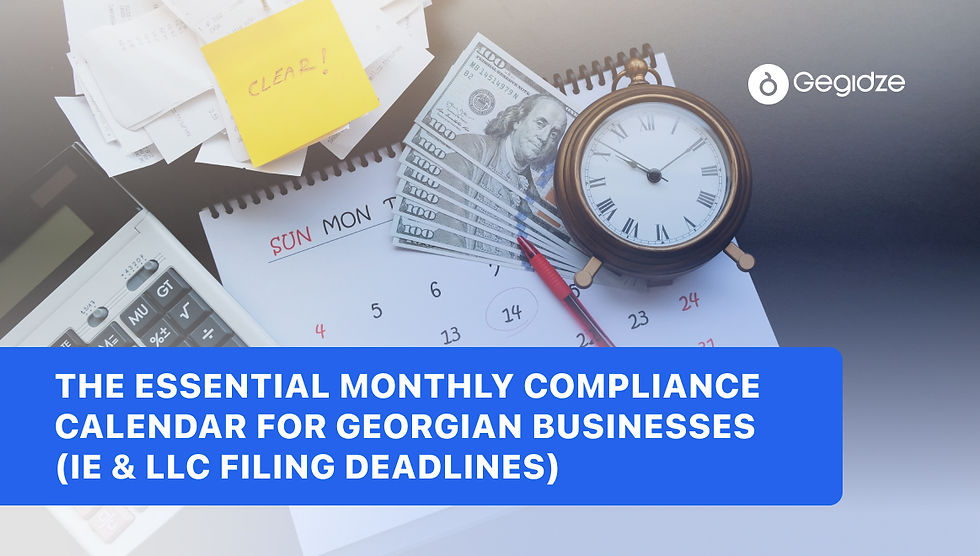7 Days Business Setup in Georgia: Scaling Beyond the Basics
- Tinatin Tolordava
- Sep 4, 2025
- 5 min read

Table of contents
Day 7 - Scale Your Business
Day 1, you learned why Georgia is famous for its 1% tax.
Day 2, you chose your structure: Individual Entrepreneur Georgia, LLC Georgia, or the Georgia Virtual Zone.
Day 3, you secured your Georgia taxpayer identification number.
Day 4, you opened your Georgian bank account.
Day 5, you learned how to file monthly tax declarations and keep your SBS Georgia status alive.
Day 6 showed you the mistakes that cost entrepreneurs their 1% tax.
Now you are here on Day 7. The last step. The question is no longer how to start. The question is how to grow.
Georgia rewards lean entrepreneurs with the SBS Georgia 1% tax up to 500,000 GEL official Revenue Service program. But at some point, your revenue, your clients, or your ambitions will outgrow the Individual Entrepreneur Georgia model. Day 7 is about planning that shift.
When SBS Georgia No Longer Fits

The Georgia 1% tax system is unbeatable for freelancers, digital nomads, and small consultants. But it has limits.
The big one is the 500,000 GEL turnover cap. Earn more than that in a calendar year, and your income above the threshold is taxed at 3%. In some cases, you can even lose access to the SBS Georgia status the following year.
That means entrepreneurs with fast-growing revenue need to think ahead. Staying small is not always realistic. This is where scaling options come into play.
Scaling Option 1: LLC Georgia
An LLC in Georgia is the natural next step when you want to grow beyond the freelancer stage.
Liability protection: your personal assets stay safe.
Credibility: clients and investors trust contracts with an LLC more than with an individual.
Tax flexibility: the Georgia corporate tax rate is 15%, but only on distributed profits. If you reinvest earnings, you pay no corporate tax.
Dividends face an additional 5% tax when distributed.
For example, a web development company in Georgia with 10 employees and contracts in Europe can run as an LLC. The founders reinvest into hiring and expansion. They pay little to no corporate tax until they decide to distribute profits.
This structure works for startups, agencies, and companies that plan to scale headcount or raise investment.
Scaling Option 2: Georgia Virtual Zone
The Georgia Virtual Zone is designed for IT and tech exporters. It is sometimes called the “tech VIP pass” because of its benefits.
The main one: 0% corporate income tax on foreign IT revenue.That means a SaaS company billing $1,000,000 abroad can legally pay no corporate tax in Georgia.
Other perks include:
No VAT on exports, so no chasing a Georgia VAT refund for IT services.
No requirement for a physical office.
Easy pairing with payroll or Georgia EOR when hiring local staff.
Who qualifies?
SaaS platforms
Software developers
Blockchain startups dealing with Georgia crypto tax
IT consulting firms
The catch is that only IT and digital service businesses qualify. Applications must clearly show software or IT activity. But if approved, the Georgia Virtual Zone is one of the most attractive tax regimes in the world.
Scaling Option 3: International Company Status
For larger service exporters, Georgia created the International Company status.
This regime offers:
Reduced tax rates on income and dividends
A stronger global reputation for compliance
A structure that appeals to investors and corporate clients
It is especially useful for outsourcing firms, shared service centers, and companies that want to use Georgia as a hub for EU-adjacent operations.
While company formation in Georgia as an LLC or Virtual Zone is enough for many entrepreneurs, the International Company status provides credibility for firms operating on a larger scale.

Beyond Tax: Payroll, VAT, and Compliance at Scale
As your business grows, new obligations appear.
Payroll taxes: If you employ staff, you must withhold 20% personal income tax plus 2% employer and 2% employee pension contributions. These are declared monthly through the Georgia Revenue Service.
VAT: Once turnover exceeds 100,000 GEL, VAT registration becomes mandatory. This also allows you to claim a Georgia VAT refund on expenses.
Corporate governance: Larger LLCs and International Companies must meet higher standards of accounting, reporting, and sometimes audits.
Scaling is not only about tax. It is also about managing people, compliance, and client expectations.
Mini Roadmaps: How Entrepreneurs Scale in Georgia
The Freelancer Who Grew Too Fast
Mariam started as an Individual Entrepreneur Georgia under SBS Georgia.
She earned 400,000 GEL her first year and thought she would stay under the cap. But her second year she passed 600,000 GEL.
She switched to an LLC in Georgia, reinvested profits, and delayed corporate tax until she was ready to distribute.
The SaaS Startup That Went Global
A small SaaS team set up through company formation in Georgia and applied for Georgia Virtual Zone.
They grew to $1,000,000 ARR with clients in the US and UK. Their foreign IT income was taxed at 0% corporate. They reinvested every lari into product development.
The Outsourcing Firm That Needed Global Trust
A 100-person outsourcing company registered as an LLC. But to win corporate contracts, they applied for Georgia International Company status.
The regime reduced their effective tax rates and gave them a recognized framework for global compliance.
These stories show how entrepreneurs move from Georgia 1% tax to LLC, Virtual Zone, or International Company status when growth demands it.
Table: Scaling Options in Georgia
Structure | Tax Benefits | Best For | Limitations |
SBS Georgia (Individual Entrepreneur) | 1% tax on turnover up to 500,000 GEL | Freelancers, digital nomads, consultants | Personal liability, turnover cap, excluded industries |
LLC Georgia | 15% corporate tax on distributed profits + 5% dividend | Startups, agencies, companies with staff | Requires accounting and compliance |
Georgia Virtual Zone | 0% corporate tax on foreign IT revenue | IT, SaaS, blockchain, crypto firms | Only IT qualifies, strict application |
International Company | Reduced tax rates, global credibility | Outsourcing, service exporters, large teams | Higher compliance standards |
Planning for Long-Term Growth
The best time to think about scaling is before you hit the 500,000 GEL ceiling.
If you are approaching the turnover cap, plan your shift to an LLC in Georgia.If you are building IT products, apply for the Georgia Virtual Zone before growth explodes.If you are running a large operation, consider the International Company status for reputation and compliance advantages.
Timing matters. Moving too early may add unnecessary complexity. Moving too late costs money.
Day 7 Action Step
Look at your business today and ask: where will it be in two years?
If you expect to pass 500,000 GEL turnover, start planning your transition. If your revenue is IT-based, prepare your Georgia Virtual Zone application.
If you are building a large international operation, research the Georgia International Company status.
Scaling is not about abandoning the Georgia 1% tax. It is about using the right structure at the right time.
The Big Picture: Georgia as a Growth Hub
Georgia is more than a tax trick.
It is a country that has built an ecosystem for entrepreneurs at every stage.
From lean freelancers on the Georgia digital nomad visa paying 1% tax, to international service exporters with hundreds of employees, Georgia has a legal and official framework for them all.
The journey you started on Day 1 is just the beginning.
With the right plan, you can grow from registering a business in Georgia as an Individual Entrepreneur to building a global company with LLC, Virtual Zone, or International Company status.
Ready to plan your growth?
Contact Gegidze today. We help you open a company in Georgia, manage compliance with the Georgia Revenue Service, and design the roadmap from 1% tax to global scale.



